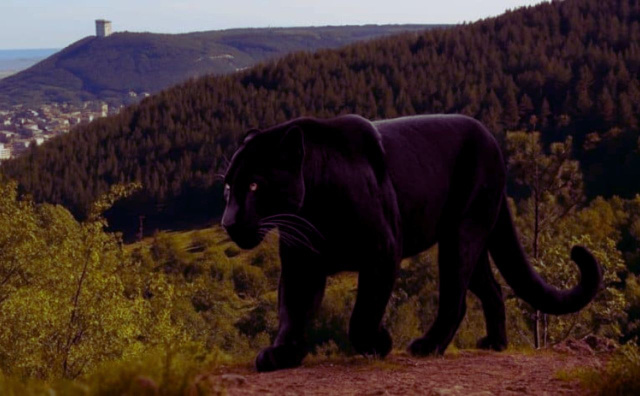
SHUMEN, Bulgaria — The search for a mysterious black predator roaming near the Shumen Plateau has entered its fourth day, with authorities intensifying efforts to track and capture the animal believed to be a melanistic big cat, possibly a leopard or jaguar.
As of Sunday, officials imposed a full and indefinite ban on public access to the Shumen Plateau Nature Park, citing serious safety concerns. The closure encompasses all pedestrian trails and paved roads, with seven police checkpoints now in place to enforce the order. A new directive expected later today may extend the restriction across the entire park’s territory.
Despite ongoing efforts, no new signs of the animal have been detected overnight. Wildlife professionals, hunters, and a visiting expert from South Africa remain on high alert, scouring the terrain in hopes of locating the predator. A temporary crisis headquarters has been set up in Shumen to coordinate the multi-agency response.
“The search has been particularly challenging given the animal’s stealth and nocturnal habits,” said one official involved in the operation. “We are doing everything possible to ensure public safety while trying to capture it unharmed.”
The predator was initially spotted near the “Founders of the Bulgarian State” Monument, where paw prints were found just 50 meters from the monument’s steps. This alarming proximity prompted an escalation in containment efforts.
In addition, a video clip recently surfaced showing a large black feline darting across a field near Isperih, some 70 kilometers from Shumen. Though filmed in April, the footage has reignited questions about the predator’s possible range and origin.
Authorities have yet to confirm where the animal came from. No local zoos have reported a missing big cat, raising suspicions that it may have been kept illegally and escaped or was deliberately released.
Experts urge the public to comply with all safety guidelines and avoid approaching the area. “The animal could behave unpredictably if it feels threatened,” said wildlife expert Alexander Dutsov in an interview with NOVA TV. “It may have adapted to urban food sources like stray dogs, which makes it more capable of surviving in semi-inhabited zones.”
Dutsov emphasized that the term “black panther” is not a species in itself but a reference to melanistic variants of big cats, most commonly leopards or jaguars. He noted that traditional tranquilizer darts are not ideal due to their delayed effect, which could allow the animal to escape and hide, complicating the capture.
Instead, the team is focusing on baited live traps as the safest and most humane method. Still, Dutsov admitted that capturing such a stealthy and potentially injured animal without harm remains a significant challenge.
Authorities continue to monitor the situation closely, with additional resources expected to join the search today. Until the predator is located, the ban on access to the Shumen Plateau Nature Park remains firmly in place.
